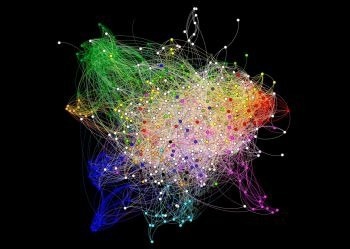
Illustration of part of the human protein-protein interaction network. Proteins are shown as circles and the lines connecting them represent a physical interaction. The connections between these proteins change in cancer cells and the network is rewired. Image Credit: University of Sussex.
Scientists at Sussex have performed this by developing a prediction algorithm that works out which genes are necessary for the cell. This could be utilized to determine actionable targets that in time could direct oncologists to customize cancer patient treatments.
Our vision is to take advantage of the decreasing cost of DNA sequencing and to harness the power of AI to understand cancer cell differences and what they mean for the individual patient’s treatment.
Dr. Frances Pearl, Senior Lecturer, Bioinformatics, School of Life Sciences, University of Sussex
Pearl added, “Through our research, we were able to identify cell-specific gene dependencies using only the DNA sequence and RNA levels in that cell, which are easily and cheaply obtainable from tumor biopsy samples.”
“This is an incredibly exciting step in our research which means that we can now work to improve the technology so that it can be offered to oncologists and help in the treatment pathways for their patients,” continued Pearl.
Usually, cancer treatments are prescribed on the basis of the location and type of cancer. Genetic variations caused by tumors could make standard cancer treatments useless. Making use of a personalized method to guide treatment could enhance life expectancy and quality of life, and also decrease needless side effects for cancer patients.
In every cell, humans have nearly 20,000 genes containing the information required to make proteins. Nearly a thousand of these genes are necessary for the cell to survive.
When normal cells turn out to be cancer cells, oncogenes (that is, those genes with the ability to cause cancer) become triggered and tumor suppressor genes become inactivated, thereby resulting in a rewiring of the cell. This makes the cell become subject to a new set of genes in order to survive, which can be exploited to kill the cancer cells.
By targeting the protein products of tumor-specific dependent genes, it is possible to kill cancer cells, thereby leaving the normal cells which are not reliant on such genes safe.
Even though it is possible for dependencies to be determined by making use of intensive laboratory techniques, it is laborious and expensive and would not be feasible to examine all tumor samples in this method.